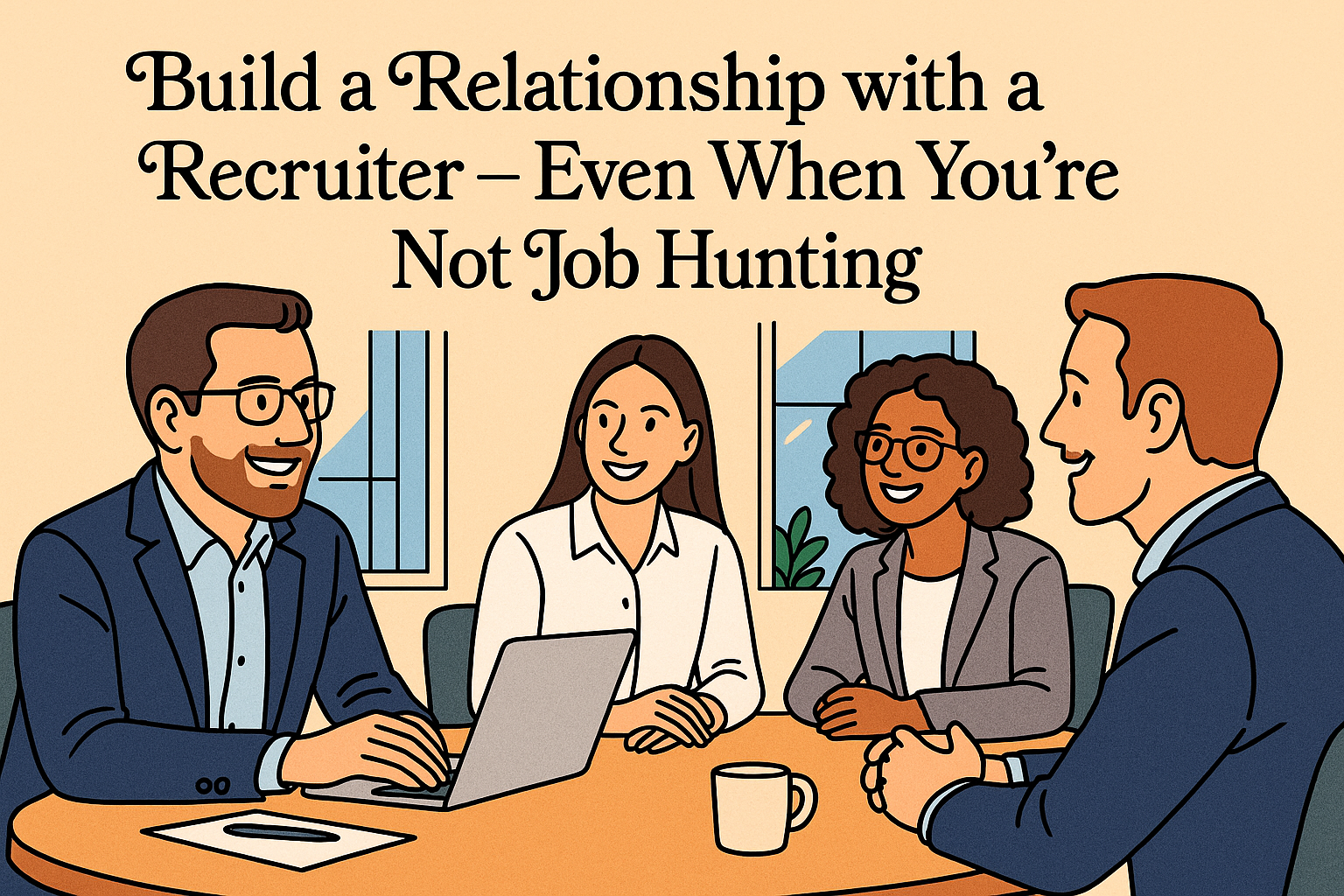When you imagine reaching out to an executive recruiter, you probably picture being unhappy in your role, actively job-hunting, and needing a new position. But what if the smart move is to start and maintain that connection long before—or without—any search?
Building a relationship with an executive recruiter while you’re in a stable role can position you for unexpected shifts, insider market insight, and future opportunity. Far from being just for job seekers, connecting with a recruiter proactively can be a strategic career move.
Why this relationship matters even when you’re not looking
1. Recruiters focus on passive talent
Executive recruiters often target leaders who aren’t actively searching. Executives are rarely on job boards—they’re pursued through direct, relationship-driven methods that prioritize long-term impact. Those who maintain ongoing connections are more likely to be top of mind when opportunities arise.
2. You build credibility and visibility
When you’re not under pressure, your outreach comes across as authentic rather than transactional. Maintaining contact helps recruiters remember you when the right role appears. Building credibility over time—not when you’re in a rush—creates stronger professional trust.
3. You gain market insight and counsel
A good recruiter understands the hiring landscape: compensation benchmarks, demand trends, and evolving leadership priorities. Engaging them while you’re not in transition lets you gather market intelligence and refine your long-term strategy with expert perspective.
4. It’s insurance for the unforeseen
Even if you’re happy in your current role, circumstances can change—new leadership, restructuring, or layoffs. Having established recruiter relationships gives you a valuable head start if you ever need to pivot quickly.
How to build and maintain the relationship
Step 1: Identify the right recruiter(s)
Focus on professionals who specialize in your function, industry, or leadership level. It’s better to have two or three high-quality relationships than dozens of surface-level ones.
Step 2: Make an introduction while you’re “well”
Reach out when you’re not actively seeking a job. Introduce yourself, summarize your experience and goals, and express interest in staying connected for future opportunities.
Step 3: Stay in touch
Check in once or twice a year—or when you’ve had a significant change, such as a promotion, major project, or shift in focus. Consistent but respectful communication keeps you visible without being intrusive.
Step 4: Offer value and respect their time
If a recruiter contacts you with a role that isn’t right, refer a qualified colleague. Share useful industry news or insights. Offer genuine collaboration and gratitude—this mutual value keeps the relationship professional and positive.
Step 5: Know what to expect
Remember that executive recruiters represent their client companies first. Their goal is to find the best fit for those roles, not necessarily to find you a job immediately. Use the relationship for networking, information, and positioning—your next opportunity may come when you least expect it.
Common mistakes and how to avoid them
- Waiting until you need a job: It’s reactive instead of strategic.
- Being vague or generic: Clarity and professionalism matter.
- Reaching out only in crisis: Build trust long before you need help.
- Dropping communication entirely: Periodic follow-up keeps you top of mind.
- Being inflexible: Stay open to conversations—even if the timing or role isn’t perfect.
Conclusion – Key Takeaways
- Building and maintaining a relationship with an executive recruiter is a strategic career investment, not a reaction to job loss.
- Establishing connections early builds credibility, visibility, and access to hidden opportunities.
- The best time to build a relationship is when your career is stable—so you’re ready when change comes.
FAQ
Q: If I’m not looking for a job, is it strange to contact a recruiter?
A: Not at all. The best time to build a recruiter relationship is when you’re not actively searching—it’s about proactive career management.
Q: How often should I reach out?
A: Every six to twelve months, or whenever there’s a meaningful update in your career.
Q: How many recruiters should I maintain contact with?
A: Two to three trusted, industry-specific recruiters are typically ideal.
Q: What should I say in my initial outreach?
A: A short message introducing yourself, your current role, key achievements, and long-term interests—no need to ask for a job right away.
Sources
- How to Recruit for Executive Positions – Medallion Partners
- Working with Executive Recruiters: Build Relationships Early – Gehl Search Partners
- How to Effectively Work with an Executive Recruiter – Riviera Partners
- How to Work with Executive Recruiters – iSmartRecruit
- Things You Must Know When Working with an Executive Recruiter – HR Lineup
- Build Winning Relationships with Executive Recruiters – Executive Career Brand
- Things You Must Know About Working with an Executive Recruiter – Senior Executive

